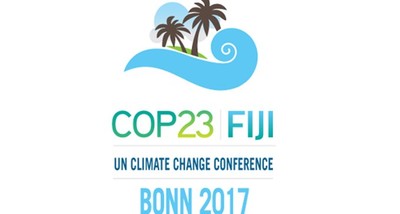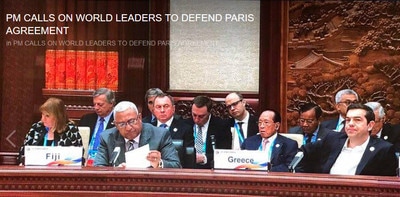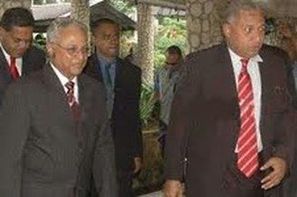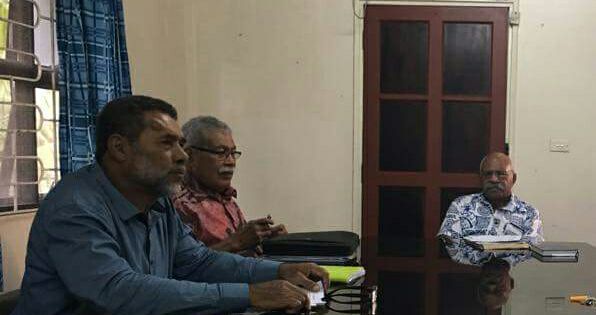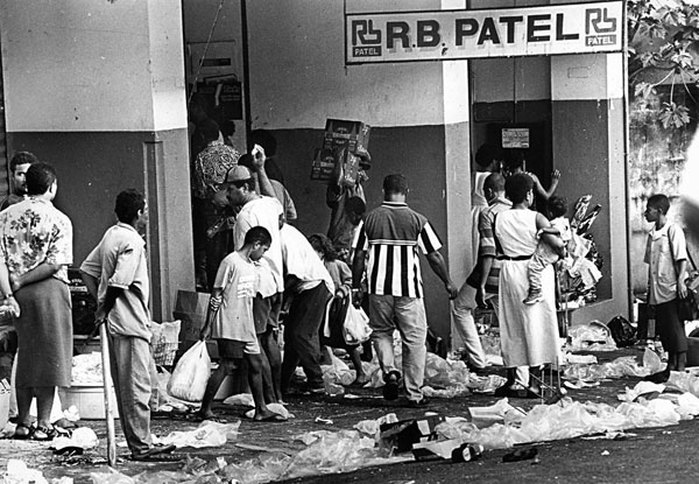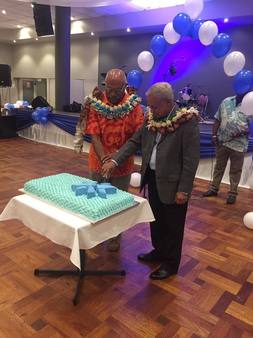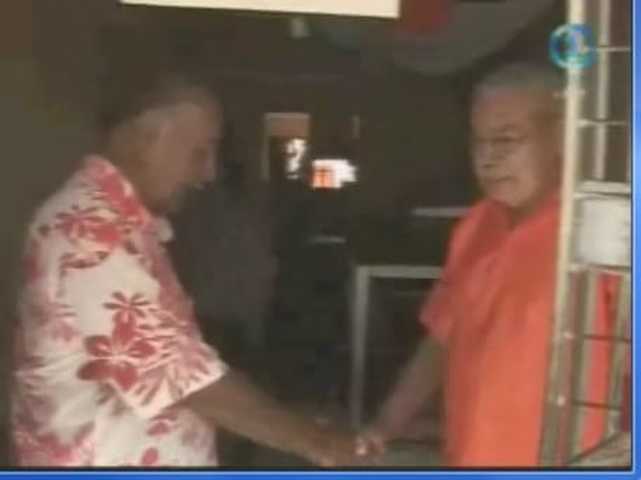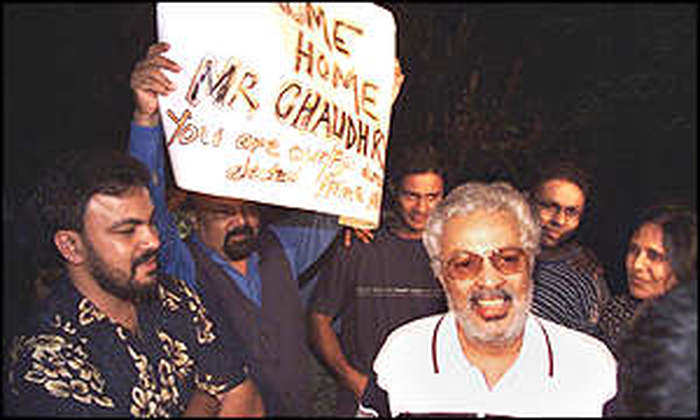"Bainimarama said he will promote the Pacific concept of talanoa which was “a process of inclusive participatory and transparent dialogue that built empathy and led to decision-making for the collective good mostly practised in Fiji. He must certainly be speaking of a mythical Fiji which does not exist except in his own confused mind. The world knows that there is nothing even remotely resembling inclusiveness or participatory dialogue in so far as decision-making is concerned in Fiji."
Prime Minister Bainimarama deserves to be crowned THE GREATEST HYPOCRITE OF ALL TIMES for his statement to COP 23 representatives in Bonn, Germany on Friday.
Bainimarama said he will promote the Pacific concept of talanoa which was “a process of inclusive participatory and transparent dialogue that built empathy and led to decision-making for the collective good mostly practised in Fiji”.
He must certainly be speaking of a mythical Fiji which does not exist except in his own confused mind.
The world knows that there is nothing even remotely resembling inclusiveness or participatory dialogue in so far as decision-making is concerned in Fiji.
The 2013 imposed constitution is a classic example of this fact – a constitution imposed on the people against their will.
Approaches by the Opposition parties for dialogue on important national issues are snubbed by him – a recent example was the call for setting up a bipartisan committee for the sugar industry.
As for finger pointing and laying blame, his Attorney General Aiyaz Khaiyum was doing exactly that as the PM was speaking in Bonn. Khaiyum was bluffing an organised gathering of students at the Montford Technical Institute in Savusavu blaming past politicians for not doing enough to develop good roads.
Bainimarama and Khaiyum have been playing the blame game for the past 10 years, blissfully ignoring the fact that the overall situation in the country has deteriorated significantly under their watch in 10 years – high cost of living, rising poverty and crime, falling health and education standards etc,etc.
Well, Bainimarama and Khaiyum have been conning people for a long time but their con game now stands exposed. They have failed to deliver and the people want truthful answers from them for the mess they have made of our beautiful country.
FLP on the 2000 coup and living under the shadow of Fiji’s coup culture:
The RFMF has been the major destabilising force in Fiji’s recent history. This is not to say that other elements were not involved. In both the 1987 and 2000 coups, the army was instigated by failed politicians, ultra nationalist elements who were bent on pushing through their supremacist agendas, greedy opportunists who saw their own advantage in destabilising the country and, of course, unscrupulous businessmen who can only thrive an in environment that fosters lawlessness and corruption. The latter have been the major financiers of the 1987 and 2000 coups. Unfortunately, this oligarchy of anti-democratic forces is still at large and the majority of them have escaped justice. They are either too powerful or too wealthy to be touched in a country where justice remains shaky or enquiries can be silenced.
The question is particularly appropriate as we head towards the 2018 national polls considering that at every general election since 2000 the spectre of another coup, should Labour win, has been raised to intimidate voters and arouse fears. Laisenia Qarase did it in 2001 and 2006. Frank Bainimarama did it just days before the 2014 polls.
The issue becomes even more relevant when one concedes that the two major protagonists in the upcoming 2018 elections will both be former Army commanders and coup strongmen – Frank Bainimarama and Sitiveni Rabuka. No doubt they continue to enjoy support within the armed forces.
The RFMF has been the major destabilising force in Fiji’s recent history. It was the key perpetrator in the 1987 coups, the main force behind the 2000 coup and again, the perpetrator of the 2006 coup. How can we forget that in leaving the country post-2000 coup, the commander of the 3FIR battalion of the RFMF, LT-Col Viliame Seruvakula bemoaned the fact that the Army had lost its professionalism.
This is not to say that other elements were not involved. In both the 1987 and 2000 coups, the army was instigated by failed politicians, ultra nationalist elements who were bent on pushing through their supremacist agendas, greedy opportunists who saw their own advantage in destabilising the country and, of course, unscrupulous businessmen who can only thrive an in environment that fosters lawlessness and corruption. The latter have been the major financiers of the 1987 and 2000 coups.
Unfortunately, this oligarchy of anti-democratic forces is still at large and the majority of them have escaped justice. They are either too powerful or too wealthy to be touched in a country where justice remains shaky or enquiries can be silenced.
Fiji’s coups have been its major stumbling block in terms of social, economic and political progress Each coup has set the country back enormously. Jobs were lost, families were split as thousands fled to seek security and a stable future overseas, a lot of pain and suffering was inflicted on innocent people. The country itself lost thousands of skilled personnel and professionals – a loss which is still being felt.
The 2000 coup was without doubt the most vicious, violent and turbulent political crisis ever experienced in Fiji. Members of the elected government were held at gun point for 56 days. The rest of the country was plunged into months of lawlessness and anarchy as rebel supporters ran riot in the capital city burning and looting, hapless rural communities were terrorised, rebels played havoc with our power supply and other essential services, while those who had usurped power haggled among themselves as to who should govern the country. Not to mention the unnecessary loss of lives in the violence.
The situation appears to get worse with every coup. The past 11 years since the 2006 coup, for instance, have been another traumatic experience for Fiji. For 6 long years since 2009 our people were subjected to authoritarian rule under draconian decrees which took away our fundamental rights and imposed rigid press censorship. There were many horrific human rights violations.
Nothing has changed since the 2014 general elections and the seeming restoration of parliamentary democracy. The oppressive decrees are still in force and political parties and the media still operate under threat of huge fines and long prison terms.
The imposed 2013 constitution is seriously flawed. A number of our fundamental rights, although enshrined, are completely or substantially derogated by decrees and other subsidiary legislation. The Constitution has drawn condemnation from the United Nations Human Rights Council which called for its comprehensive review to ensure that it provides for separation of powers and that it reflects the “will and aspirations of the people of Fiji”.
The 2013 constitution carries in itself the seeds of instability and so there can be no guarantee that Fiji will not suffer further destabilisation and political turmoil. Free, fair and credible elections are just not possible under this Constitution and the accompanying laws and oppressive decrees.
The Bainimarama government appears averse to making the changes recommended by the Multinational Observer Group and the Fiji Electoral Commission in their 2014 reports to enhance the fairness and transparency of the electoral process. This renews fears of another rigged election with ensuing instability.
All these make it imperative that opposition parties unite to fight for a level playing field to defeat the reactionary forces now in control of the nation.
There is no other way to 2018.
From The Fiji Sun archive, June 2007
By VICTOR LAL
Security forces pose biggest threat to democracy: Chaudhry
“Of course, there were some loud protests about the fact that we were unelected. The protestors found it difficult to accept that in the Fijian environment at that time, it was simply not feasible for the ousted [Chaudhry] government to return to office. That would have led us into even greater difficulties. Emphasis on legal and constitutional niceties might have played well in certain overseas forums, but in 2000 they had little relevance to the reality of our position. The constitution had become just a piece of paper. We need pragmatism and common sense to help us move forward.”
Interim Prime Minister Laisenia Qarase on 2000 coup
“The constitution requires the President to be appointed by the Great Council of Chiefs in consultation with the Prime Minister. In the next questionable move Ratu Josefa Iloilo, placed in office after the coup and who the Appeals Court declared to be in an acting capacity only, convened a meeting of the Great Council of Chiefs, and got himself appointed President...The Chief Justice [Daniel Fatiaki] has, in my view, continued to frustrate legal challenges to some of the developments since the terrorist attack of 19 May 2000 by interfering with the judicial process, and indulging in judge-shopping. Such antics have brought disrepute to the judiciary, and puts its integrity and credibility on the line. Much of what has transpired in the last couple of years has, I contend, been done with the connivance or complicity of some members of the judiciary”
Deposed Prime Minister Mahendra Chaudhry on the 2000 coup
The Fiji Sun
June 2007
The coup culture in Fiji, the Interim Finance Minister Mahendra Chaudhry recently told India, was part of the political process, which he hopes will be eradicated when we return to democracy. Back home, the Interim Government has embarked on finding the causes of the coup culture, and how a stop could be made to it. Maybe, it should begin by interrogating the views of one its own – Mr Chaudhry who, in 2002, wrote up a detailed thesis on the coup culture in the country.
His views titled “The Aftermath of a Coup: Power grabs and destabilization in Fiji” are contained in The Parliamentarian, the journal of the Parliaments of the Commonwealth, and the views were expressed after he was overthrown in part-Fijian George Speight’s 2000 coup.
Mr Chaudhry contended that the security forces posed the biggest threat to the stability to any democratically elected government in Fiji. The people of Fiji, he reminded his fellow Commonwealth parliamentarians, had been victims of three military coups to date. “The events of the past two years in particular have shown that neither the police nor the army can be trusted to uphold the constitution and maintain law and order. No elected government that is not of their choice will ever be safe in this country if this situation is allowed to go unchecked,” he wrote. Indeed, unless this situation is negated, he claimed, “Fiji will simply become another Indonesia where the military has formed an oligarchy with allegedly corrupt politicians and business interests”.
He claimed in his analysis that the Fijian army was split along provincial loyalties, was ethnically biased and some from among its ranks had allegedly become dangerous mercenaries. Mr Chaudhry maintained that the military had maintained a power bloc with corrupt politicians, unscrupulous businessmen and factional groups from the three Fijian confederates and the provinces to ensure that the held the reins of government, irrespective of who won the elections. He even claimed that the Fiji Police Force had been infiltrated by the army and could no longer be trusted to maintain law and order. The whole issue of security, he claimed, had racial overtones. Indo-Fijians and indeed Indo-Fijian politicians could no longer trust either the army or the police. “Racial parity both in the police force and in the army is, therefore, imperative,” he said.
What about the role of Commodore Frank Bainimarama in the 2000 crisis? In the same issue of The Parliamentarian the recently deposed Prime Minister Laisenia Qarase had expressed his own views about the reasons for the coup culture in Fiji under the title “Rebuilding peace, stability and prosperity in Fiji”. Typically, he had defended the attempted coup in the now famous “Tagi ni Taukei” theory. According to him, on 19 May 2000 he was visiting one of the country’s outer islands as chairman of a select committee of the Senate when “suddenly someone came rushing into the meeting room to relay a radio report about an attempted coup in the capital Suva”. The news, according to him, stunned the committee members, and they were all filled with apprehension about the consequences for the country. In a set of circumstances Mr Qarase could never have imagined, he was asked to take a leadership role in steering Fiji back from the brink.
According to Mr Qarase, the military took action to protect the safety and security of citizens and the integrity of the state. It was never, he claimed, their intention to form a permanent military government. They were committed, especially, to ensuring Mr Chaudhry and other hostages were freed unharmed. They succeeded in that after very complex negotiations. He pointed out that the army returned to the barracks at the end of 2001, when the National Security Council judged that law and order had improved to the point when the police could again resume their normal role.
Reflecting on the first days after 19 May 2000, Mr Qarase told his fellow Commonwealth parliamentarians: “I followed the drama of the insurrection closely, as a citizen very much concerned for his country. Fiji was experiencing an unprecedented ordeal and when the army moved I felt it had an opportunity to bring back order and help people to feel safe in their homes again. But at no stage did I think I would be called on to play a part in the saving of the country.” As we know, Mr Qarase’s whole career had been in the civil service, development banking and commercial finance.
According to him, in early June, Commodore Bainimarama asked him if he could give financial advice to the military administration. “I did not hesitate. In my view-and that of many others-the army was motivated out of concern for the country. It gave hope when all was darkness. It was not long after this that I was asked by Commodore Bainimarama to head an interim civilian cabinet with freedom to appoint Ministers of my choice. There was a more difficult decision to make here. Acceptance meant giving up a well-paying and secure post as Managing Director of Merchant Bank. I would be moving into an extremely volatile and possibly dangerous political environment. I had my wife, children, and grandchildren to think about. They were central to my life,” Mr Qarase wrote.
But the love of Fiji and her hour of need made Mr Qarase accept Commodore Bainimarama’s offer to become interim Prime Minister. The interim military administration soon gave way to an interim civilian government. Commodore Bainimarama invited the Great Council of Chiefs to appoint a civilian President. They duly appointed Ratu Josefa Iloilo, who had served as Vice-President to the ousted President Ratu Sir Kamisese Mara.
Looking on his appointment, Mr Qarase wrote: “Of course, there were some loud protests about the fact that we were unelected. The protestors found it difficult to accept that in the Fijian environment at that time, it was simply not feasible for the ousted government to return to office. That would have led us into even greater difficulties. Emphasis on legal and constitutional niceties might have played well in certain overseas forums, but in 2000 they had little relevance to the reality of our position. The constitution had become just a piece of paper. We need pragmatism and common sense to help us move forward.”
Mr Qarase also pointed out that the civil service had stayed solidly intact as a neutral and independent body, the Reserve Bank was vigilant in maintaining financial stability, and the judiciary dispensed justice; the court remained open. There was, however, division among the judges, he conceded, over the actions of Chief Justice Sir Timoci Tuivaqa, who later spoke of fundamentally differing perceptions of the rule of law, separation of powers and judicial independence at a time of dangerous and confusing crisis.
According to Mr Qarase, the former CJ “acted to preserve the judiciary because without it, Fiji would have moved closer to total collapse”. “My Interim Administration fully supported the actions he took. Pragmatism and common sense in safeguarding the well-being of the state and all its citizens clearly constituted the right approach to take in the circumstances. Those who favoured a strictly legalistic approach were out of touch with reality. Sir Timoci, in my view, has been vindicated,” Mr Qarase asserted.
Someone asked Mr Qarase whether the response of the international community had been helpful in Fiji’s endeavours to put our situation right. He answered as follows: “I have said that we always felt we had the ability to solve our own problems, in our own way. We appreciated those countries which understood this, who gave us space and did not try to pressure us.”
Ironically, the alchemy of exile, and the loss of political power have forced the deposed Prime Minister Qarase to sing to a totally different tune from his native Mavana Island in Lau. He is not in a mood to listen to Commodore Bainimarama’s plea for pragmatism as the army chief tries to search for solutions to move the country forward from the debris of a fourth coup.
Mr Qarase is, however, following in Mr Chaudhry’s footsteps. In his article in the Parliamentarian, Mr Chaudhry recalled Justice Anthony Gates now famous 15 November 2000 judgment that the interim administration then led by Mr Qarase had “no constitutional foundation of legality”. Mr Chaudhry told his fellow Commonwealth parliamentarians that faced with the intransigence of those who grabbed power, his deposed Peoples Coalition government had no other recourse but to seek redress through the courts.
Meanwhile, the army, the President and the interim administration gave an assurance to the Commonwealth and the rest of the international community that they would abide by the Appeals Court ruling. On 1 March 2001, the Fiji Court of Appeal, Mr Chaudhry noted, upheld the Gates ruling and the validity of the constitution. It went further and ruled that the actions of the army commander in abrogating the constitution and assuming executive authority could not be justified under the doctrine of necessity.
The ruling paved the way for Parliament to be reconvened and the elected government restored to office. This, however, was hardly what the post-coup authorities had in mind. “What took place in Fiji next was a blatant and wilful distortion and manipulation of the constitutional and legal system to allow the army-backed regime to continue in office,” Mr Chaudhry claimed.
On 14 March 2001, President Ratu Josefa dismissed Mr Chaudhry and proceeded to appoint Ratu Tevita Momedonu, a member of Chaudhry’s ousted government, as Prime Minister for 24 hours to legalize his next move. He then dissolved Parliament on Ratu Tevita’s advice and reappointed Mr Qarase as caretaker Prime Minister. In his analysis of the events, Mr Chaudhry described Ratu Tevita as “a puppet Prime Minister” and the whole appointment for a day was farcical and it made a mockery of the constitution.
Mr Chaudhry also went on to berate the President himself: “The constitution requires the President to be appointed by the Great Council of Chiefs in consultation with the Prime Minister. In the next questionable move Ratu Josefa Iloilo, placed in office after the coup and who the Appeals Court declared to be in an acting capacity only, convened a meeting of the Great Council of Chiefs, and got himself appointed President.”
What all these events clearly meant, he claimed, was that Fiji’s post-coup authorities had no respect for the rule of law.
Mr Chaudhry once again also cast doubt on the subsequent 2001 general elections, claiming that the elections were not free and fair. He also attacked the suspended Chief Justice Daniel Fatiaki, who had replaces Sir Timoci.
“The Chief Justice has, in my view, continued to frustrate legal challenges to some of the developments since the terrorist attack of 19 May 2000 by interfering with the judicial process, and indulging in judge-shopping. Such antics have brought disrepute to the judiciary, and puts its integrity and credibility on the line. Much of what has transpired in the last couple of years has, I contend, been done with the connivance or complicity of some members of the judiciary,” Mr Chaudhry claimed.
He also condemned the Commonwealth for hastily and injudiciously lifting sanctions etc on Fiji. While condemning the forces of destabilization, he said the Commonwealth was effectively giving tacit encouragement to these elements.
Reflecting on the tragic and bloody 2 November 2000 mutiny at the Queen Elizabeth Barracks when the rebels made a last ditch attempt to seize the army headquarters and remove Commodore Bainimarama, Mr Chaudhry told his fellow Commonwealth parliamentarians: “It is important to note hear that the army’s decisive move to restore law and order was driven more by its determination to purge its own ranks of rebellious elements and their supporters who posed a threat to the commander’s life, than from a desire to restore democracy. Furthermore, having achieved the objectives of the coup and established a government of its choice, it was ready to provide the stability that was a prerequisite for that administration to function effectively.”
Thereafter, it quickly became clear, Mr Chaudhry continued, that the army-backed interim administration had no intention of relinquishing power and restoring the elected government to office. “Today there is convincing evidence that senior army officers and several senior members of the post-coup administration had been party to the conspiracy to overthrow the People’s Coalition government,” Mr Chaudhry claimed. He contended that the security forces posed the biggest threat to stability to any democratically elected government in Fiji.
And yet Mr Chaudhry had no hesitation to become Interim Finance Minister in a military-led government? Why? A coup is a coup? Who are the senior army officers who pose a threat to Fiji?

